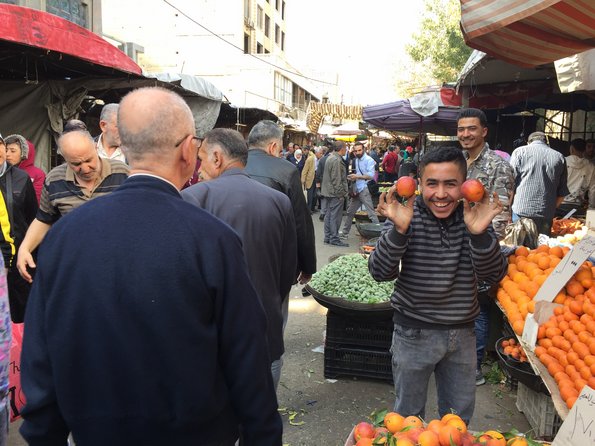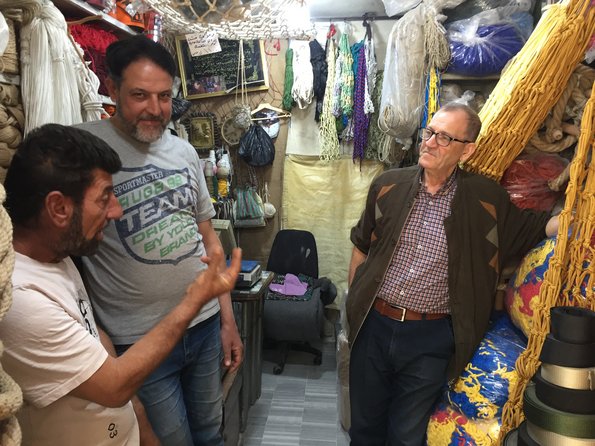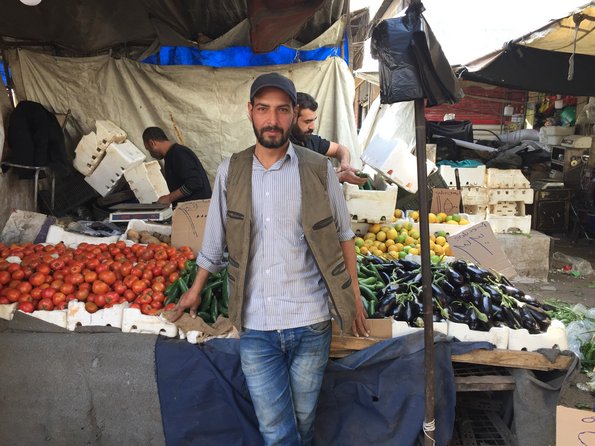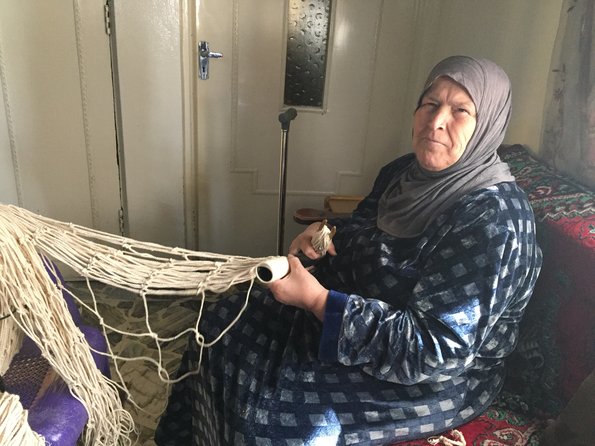Life under pressure – the difficult everyday life in Syria
by Karin Leukefeld, Damascus/Yabroud
In a branch of the state-owned Syrian Commercial Bank in Al-Qassaa, a district of Damascus, there is a dense crowd. Behind the high counters, bank employees sit in front of their computers, typing names and numbers into forms, then sending customers on to the next branch. Some customers wait patiently, others push their way forward with little consideration. Some run from one counter to the next, searching with their forms, until one of the employees takes care of them and escorts them to the right counter.
In the commercial bank fees for electricity or water, taxes or insurance for the car are deposited. But pensions are also collected or special payments are made to families of the fallen or injured.
On this day, the author has to pay the fees for her residence permit, which has to be applied for every year. When the bank employee holds the German passport in her hand, she looks up in disbelief: “What are you doing here,” she asks. “Why are you coming from Germany to Syria, when we Syrians all want to go to Germany?!” The bystanders laugh and glance over briefly, then turn back to their own business.
A middle-aged woman, her headscarf tied tightly around her, quietly tells us that she is collecting the pension for her father. She comes every two months; the walk had become too tedious for her father. During the war years, the pension had been adjusted several times for inflation. Today, her father receives 8,000 Syrian pounds a month, almost twice as much as before the war. His monthly pension back then was equivalent to about 80 US dollars; today, that money is worth no more than 3 US dollars. Every two months she now collects 16,000 Syrian pounds, the woman says in a lowered voice: “That’s just enough for a meal.”
Indebted and destroyed
Since the beginning of the war in Syria in 2011, the then very stable economic situation has steadily deteriorated. In 2011, the country was debt-free. The consequences of the war and ongoing sanctions by the EU and the USA are contributing to the disintegration of the economic and social structure in Syrian society. A sign of this is the disappearance of a stabilising middle class; black market trade and corruption are on the rise.
At the end of 2021, around 12 million people, 55 per cent of pre-war Syrian society, were considered poor and dependent on food aid, according to the World Food Programme WFP. Resources such as oil, gas or cotton – which are available in Syria – cannot be used by the whole country and have to be bought on the international market.
Many Syrian state institutions, including the central bank, are excluded from the international money market because of Western sanctions. Syria is indebted and has hardly any foreign currency. The national currency, the Syrian lira (SYP), has lost value. In 2011, the exchange rate between the Syrian lira and the US dollar was 1 US dollar = 50 SYP. Today, the unofficial exchange rate is 1 US dollar = 3800 SYP. Officially, the exchange rate is 1 US dollar = 2000 SYP.
Al Souk al Adiq – The Old Market
During the days of the fasting month of Ramadan, the markets only fill up in the afternoon. Then people stream past the many stalls with fruit and vegetables, cheese, fish and sweets to bring home some of the large selection for breaking the fast in the evening. The Old Souk, Al Souk al Adiq, is what the people of Damascus call the popular market on Al Ammara Street, at the northern end of the Old City. In the past, farmers from the surrounding countryside used to come with their fruit and vegetables, chickens, eggs and milk to offer everything fresh. When the new wholesale market, the Souk al Hal in Zablatani, was built a few kilometres further south, the farmers brought their goods directly there. Today, the trucks that transport goods to Iraq or as far as Saudi Arabia are also loaded at the new Souk al Hal.
The Old Souk offers everything: strawberries, herbs of all kinds, dates from the United Arab Emirates. There are kiwis from Tunisia, ginger from China, dates and pomegranates from Jordan. “They’re not fresh, they come from the fridge,” says a vendor apologetically. “It’s not the season for pomegranates now.” The products from abroad are expensive and customers only buy them in very small quantities, says the date seller, who used to have much more turnover, especially during Ramadan. Dates are part of the ritual of breaking the fast, but many families do without them today for cost reasons.
A separate stall sells cheese and eggs, which are brought from Saidnaya, about 30 km away. In the past, a pallet of 30 eggs cost 250 to 300 Syrian pounds. Today, the price per pallet is 11,000 SYP. At the neighbouring stall there are fruits and vegetables that come from Syria, except for the Egyptian potatoes: Large avocados from the coast, where also the oranges come from. Garlic, potatoes, cucumbers, tomatoes, onions, aubergines, lettuce – everything is artfully piled up and displayed.
Good tomatoes from the Hauran
Here Abu Ahmad, who was just 15 years old when he started working at the vegetable stall in 2003, sells. He is sorting out the soft and less attractive tomatoes from a large, sprawling basket of tomatoes. He works seven days a week from 9:00 in the morning to 9:00 in the evening, he says on the side. His daily wage is 15,000 SYP, but that is not enough for him, his wife and three children. He also worked here during the war, he continues. In 2009, he had completed his military service and fortunately was not called up again during the war.
At 3,000 SYP per kilo, the tomatoes are very expensive because they are grown under plastic sheets near Banias, on the coast. From there they have to be transported to Damascus, and that is expensive: “Diesel is expensive, but also the fertiliser that has to be bought abroad is expensive,” explains Abu Ahmad, Ahmad’s father. What is bought abroad has to be paid for in US dollars, which makes everything more expensive. The good tomatoes, grown naturally – not under plastic sheets – are available between May and December and come from Hauran (Deraa). That is not far from Damascus, and so the tomatoes from there are not only better, but also cheaper. But they are not always available. When Abu Ahmad started working at the market 19 years ago, people would buy 5 kilo boxes of tomatoes for 100 SYP, he recalls. Today, they buy a quarter or maybe half a kilo of tomatoes; more is too expensive, he says.
Fresh fish hardly affordable
A few steps away, Abdul Rahman Afan stands in front of his fish shop. His fish is good and fresh, he praises the goods. The fish come from fish farms in the Ghab, a fertile plain along the Orontes River in Idlib. Others come from fish farms in Anjar, in neighbouring Lebanon. He also offers fish from the Euphrates, and the shark hanging from the ceiling behind him was caught in the Mediterranean near Latakia. Salmon is imported and costs 50,000 SYP per kilo – for some people that is a month’s salary. Before the war, his business was really good, he recalls. Restaurants and hotels were his customers, and ordinary people, families, would buy 3 kilos of fish for 100 to 200 SYP, depending on the type of fish.
Today, a kilo costs at least 18,000 SYP, hardly anyone could still afford it. People buy the fish by the piece or they buy the small, cheaper sardines, Afan says: “And when they buy fish, they need oil, which has become very, very expensive. And they need at least potatoes to go with it, the price of which has also gone up,” says Abdul Rahman Afan, shrugging his shoulders. Abdul Rahman took over the fish shop from his father, who in turn inherited the business from his father. He will never give up the family business, but he is thinking of selling the shop here in the Old Souk and perhaps opening three or four smaller shops in different locations. But who could find 1 billion Syrian pounds to buy the shop?! Business is bad, but if he sells now, he will lose additional money.
Leather and ropes
One of the countless alleys and narrow streets leads into a quiet, covered passageway that ends at a wall. Here is the market for leather and ropes, here is the shop of Bassam Hawary, who, like most of the traders in the Old Market, also comes from a family of traders. His father sold tyres for cars, two-wheelers and carts, Bassam Hawary sells nets made of canvas and nylon. They are used for transport, for decorations or in sports for hand goals and football goals, he explains. Looking at a hammock hanging from the ceiling, he says there is not much demand for such things today. He opened his shop 25 years ago and business was good before the war. Even during the war, he was able to sell well, but now the situation is worse than ever. He had built up the business so that his sons could take it over one day. But they now live in Abu Dhabi, in the United Arab Emirates: “They can’t find decent work here anymore.”
Prices have risen enormously, Hawary says. There is no longer as much Syrian cotton as before the war, and transport has become very expensive because of the shortage of petrol and diesel. “Yet we have enough oil to supply the whole country! We have oil, cotton and wheat and everything is in our country.” But Syrian resources are no longer there for the whole of Syria. The largest cotton growing areas in the Euphrates Valley are under US occupation and Kurdish control, and only a fraction of them reaches the processing textile factories in Aleppo, and at a high cost. Today, cotton from Al Ghab, the fertile Orontes Valley, which was occupied for years by Islamists – with the support of Turkey – is mainly processed there. Most of the cotton that is processed in Syria today comes from China – just like the nylon ropes. And it has to be paid for in foreign currency.
Umm Issa, the net weaver
The nets that Bassam Hawary sells in his shop are still knotted by hand in Yabroud, about 80 km north of Damascus. Umm Issa Barakati is responsible for production and distributes the orders to five other women. She herself learned the work from her mother, and she was six years old at the time. “And, how old do you think am I today,” she smiles. “Today I am 79 years old and only have some problems with my knees.” For more than 100 years, she says, the women in her family were known as net weavers. Back then, nets were also knotted for hunting; no machine could do this work like she and the other women, she is convinced.
Umm Issa, Issa’s mother, lives with her daughter and her family. The daughter has a shop, she cooks and cleans the flat and helps where she can, she says proudly. The son also has work, she adds. “I thank God that we can live well.”
The simple workstation is in the reception room of her flat. Cotton is rolled up on a wooden trestle. In front of her, on a chair, is another trestle, on which is rolled up the finished net she is knotting with a wooden shuttle. She knots about five metres of net a day, says Umm Issa. For this she receives 2,000 SYP and is satisfied. She has just received an order from Saudi Arabia – through Bassam Hawary, whom she calls Abu Muhannad, Muhannad’s father: “We are to knot curtains for doors. 1.70 metres wide and 2.25 metres high. We are waiting for the ropes so that we can start work.” •
(Translation Current Concerns)



